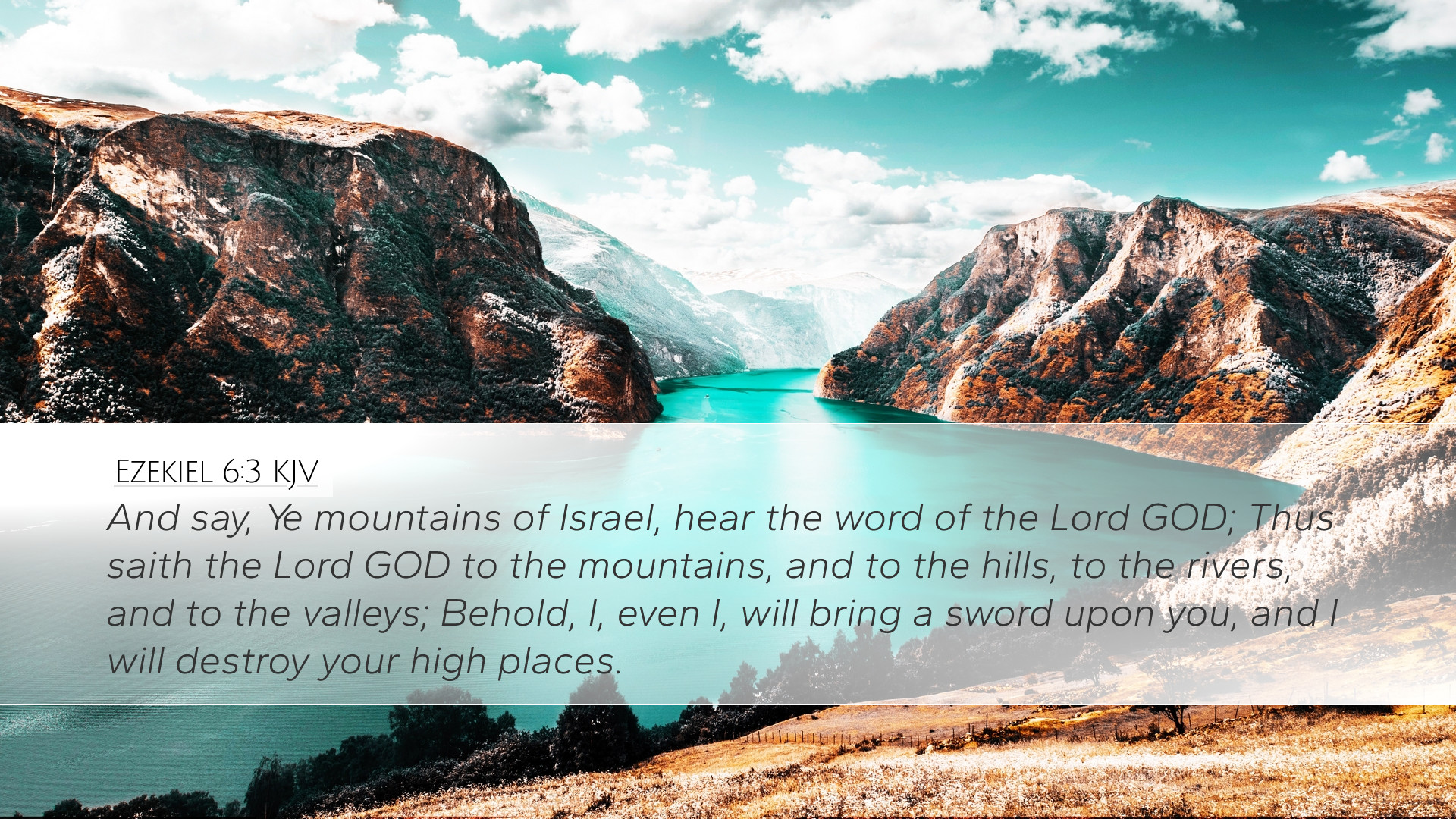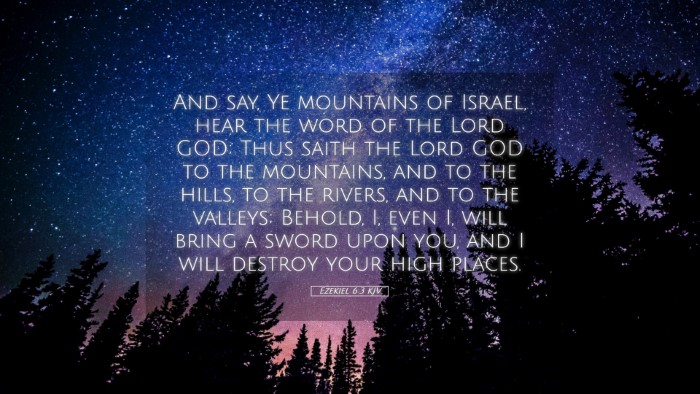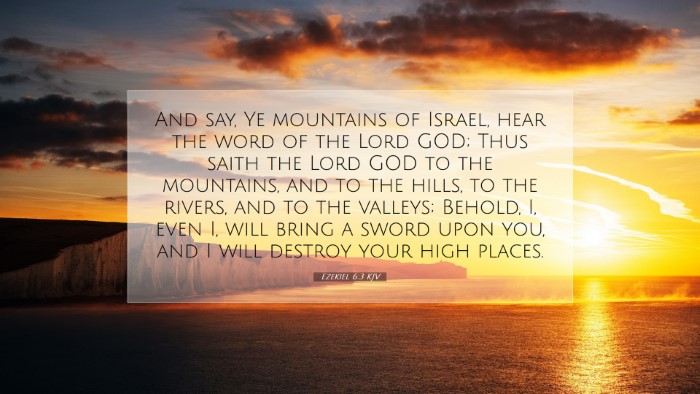Ezekiel 6:3 - Commentary Summary
Verse Text: "And say, Ye mountains of Israel, hear the word of the Lord God; Thus saith the Lord God to the mountains and to the hills, to the rivers and to the valleys; Behold, I, even I, will bring a sword upon you, and I will destroy your high places."
Introduction
The verse of Ezekiel 6:3 is a dramatic proclamation that serves as a warning to the people of Israel and highlights the impending judgment from God. This commentary synthesizes insights from several notable public domain commentaries, particularly those of Matthew Henry, Albert Barnes, and Adam Clarke, providing a thorough examination of the implications of this passage. The verse addresses not only the physical geography of Israel but also its spiritual state, emphasizing the connection between nature and divine intention.
Contextual Background
The Book of Ezekiel is a prophetic work that unfolds during a tumultuous time in Israel's history, particularly during the Babylonian Exile. Ezekiel, called as a prophet, delivers messages of warning, judgment, and eventual restoration. The imagery used in Ezekiel 6:3 embodies the sense of severity and urgency in conveying God's message to the nation, as it forewarns of the consequences of idolatry and moral decay.
According to Matthew Henry, Ezekiel's ministry focuses on both judgment and hope, underscoring the necessity of repentance for the restoration of Israel. The specificity of “mountains,” “hills,” “rivers,” and “valleys” symbolizes the entirety of the land, illustrating that no aspect of creation will be left untouched by God's judgment.
The Call to the Mountains
This passage begins with a summons to the “mountains of Israel.” Albert Barnes emphasizes that this call signifies the recognition of the mountains and hills as witnesses to the engagement of Israel in idolatry. The mountains are both literal locations and metaphorical representations of the high places where idolatrous worship occurred. Such high places were often associated with rituals against the commandments of God.
God's Direct Address
In this verse, God speaks directly, asserting authority as "the Lord God." Adam Clarke notes that this direct address highlights God's sovereignty and the seriousness of His message. The repetition of “I, even I,” stresses the uniqueness of God's action—He is not only aware of the wrongdoing but actively responding to it. This divine personal engagement evokes a sense of urgency, as it asserts God's intention to execute judgment personally.
The Imminent Judgment
The declaration, "I will bring a sword upon you," signifies impending destruction and serves as a metaphor for the judgment that Israel would experience due to their unfaithfulness. Matthew Henry elaborates on this by indicating that the sword symbolizes both literal violence as well as spiritual and moral devastation. God’s plan involves the dismantling of Israel's idolatrous practices that took root in the high places. This destruction is not arbitrary but is a reflection of the overarching theme of God's justice in response to the sins of His people.
The High Places
The reference to "high places" idiomatically implies locations of worship that contravene God’s commandments—sites where the people of Israel engaged in idolatry. Albert Barnes illustrates this further by explaining that these high places were places where false gods were worshipped and are emblematic of Israel’s rebellion against God. The destruction of these high places symbolizes the eradication of false worship, emphasizing the importance of purity in worship and devotion to God.
Theological Implications
From a theological perspective, Ezekiel 6:3 poses serious considerations regarding divine judgment and human accountability. God’s direct judgment upon the land serves to remind the reader of the consequences of sin, the critical importance of fidelity to one's covenant with God, and the reality of spiritual influence through physical locations. Matthew Henry points out that failure to heed God’s warnings, as reflected in the actions of Israel, leads to inevitable divine retribution.
This passage encourages contemporary readers, including pastors and theologians, to assess their own contexts and to understand the seriousness with which God regards idolatry and the dedication of one’s heart to divine worship. Clarke reminds us that the high places of our own hearts—our priorities and distractions—must be aligned with God’s will.
Application for Today
The careful examination of Ezekiel 6:3 encourages modern believers to reflect upon the "high places" within their own lives—those things that may stand between them and a fully devoted relationship with God. For pastors and educators, this passage serves as an admonition to guide congregational teaching towards purity of worship and the rejection of spiritual distractions.
- Self-Examination: Believers are urged to evaluate what occupies the “high places” in their own life, ensuring these areas are surrendered to God.
- Responsibility in Worship: The importance of maintaining purity in worship is paramount; congregations should assess any practices, traditions, or influences that could detract from honoring God.
- Understanding Judgment: Recognizing that God's grace is coupled with accountability encourages a healthy fear of the Lord and respect for His commandments.
Conclusion
Ezekiel 6:3 serves as a profound reminder of God's sovereignty and the seriousness of idolatry. The vivid imagery of God's judgment upon the mountains, hills, rivers, and valleys encapsulates the depth of His concern for His people and the land He gave them. By integrating insights from Matthew Henry, Albert Barnes, and Adam Clarke, this commentary dissects the significance of the verse and its implications for both the original audience and modern-day believers.
The call to worship the one true God remains a central imperative of the Christian faith, elucidating the importance of aligning every aspect of life to please God. As we heed the lessons from Ezekiel, may we actively combat the high places in our lives that conflict with God’s call to fidelity and righteousness.


